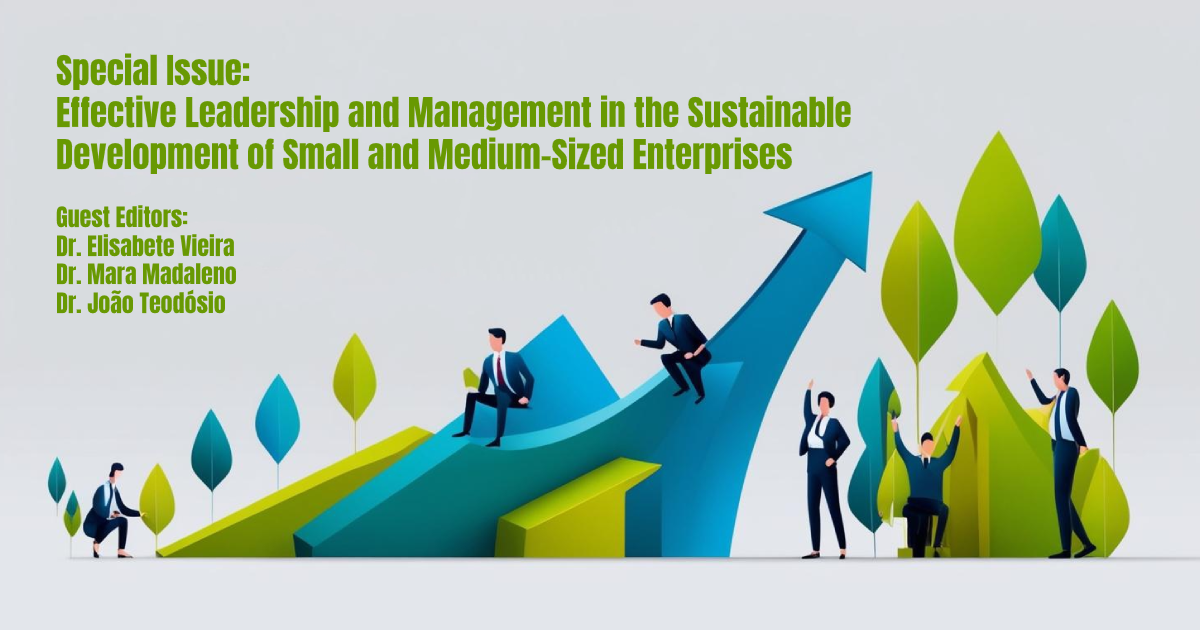- 3.1Impact Factor
- 5.6CiteScore
- 28 daysTime to First Decision
Effective Leadership and Management in the Sustainable Development of Small and Medium-Sized Enterprises
This special issue belongs to the section “Leadership“.
Special Issue Information
Dear Colleagues,
According to Martins et al. (2022), research on sustainability issues has mainly focused on larger firms. However, according to the International Finance Corporation (2023) micro-, small, and medium enterprises (MSMEs) represent 90% of world businesses, contributing to around two-thirds of the world’s employment and almost one-half of the global gross domestic product (GDP). Additionally, it is expected that SMEs will become a major driver of world sustainable development (World Economic Forum, 2021).
Since the literature devoted to sustainability on SMEs is scarce (Almeida et al., 2022; Zhu & Huang, 2023) and considering their future relevance to the achievement of this global purpose, this Special Issue intends to promote research focused on SMEs’ leadership for a better understanding of the determinants and mediators of SME sustainable development.
Although not limited to only these topics, we call for articles trying to answer the following questions:
- Are there leader demographic/psychological characteristics or organizational characteristics (e.g., ownership structures, governance structures) that promote or inhibit the sustainable development of SMEs?
- Which are, from the leader’s perspective, the most relevant external determinants for the sustainable development of SMEs?
- Are leaders using sustainable finance instruments to implement the sustainable development of SMEs? If so, which are the most common?
We request that, before submitting a manuscript, interested authors initially submit a proposed title and an abstract of 300-500 words summarizing their intended contribution. Please send it to the Guest Editors (Email A) or to the Administrative Sciences Editorial Office (admsci@mdpi.com). Abstracts will be reviewed by the Guest Editors to ensure proper fit within the scope of the Special Issue. Full manuscripts will undergo double-blind peer review.
References:
International Finance Corporation (2023). SME Finance Forum, Annual Report 2022. https://www.smefinanceforum.org/about/annual-report.
Martins, A., Branco, M.C., Melo, P.N., & Machado, C. (2022). Sustainability in Small and Medium-Sized Enterprises: A Systematic Literature Review and Future Research Agenda. Sustainability, 14, 6493. https://doi.org/10.3390/su14116493.
World Economic Forum (2021). Future Readiness of SMEs: Mobilizing the SME Sector to Drive Widespread Sustainability and Prosperity. https://www3.weforum.org/docs/WEF_Future_Readiness_of_SMEs_2021.pdf.
Zhu, J. & Huang, F. (2023). Transformational Leadership, Organizational Innovation, and ESG Performance: Evidence from SMEs in China. Sustainability, 15, 5756. https://doi.org/10.3390/su15075756.
Dr. Elisabete Vieira
Dr. Mara Madaleno
Dr. João Teodósio
Guest Editors
Manuscript Submission Information
Manuscripts should be submitted online at www.mdpi.com by registering and logging in to this website. Once you are registered, click here to go to the submission form. Manuscripts can be submitted until the deadline. All submissions that pass pre-check are peer-reviewed. Accepted papers will be published continuously in the journal (as soon as accepted) and will be listed together on the special issue website. Research articles, review articles as well as short communications are invited. For planned papers, a title and short abstract (about 250 words) can be sent to the Editorial Office for assessment.
Submitted manuscripts should not have been published previously, nor be under consideration for publication elsewhere (except conference proceedings papers). All manuscripts are thoroughly refereed through a double-blind peer-review process. A guide for authors and other relevant information for submission of manuscripts is available on the Instructions for Authors page. Administrative Sciences is an international peer-reviewed open access monthly journal published by MDPI.
Please visit the Instructions for Authors page before submitting a manuscript. The Article Processing Charge (APC) for publication in this open access journal is 1600 CHF (Swiss Francs). Submitted papers should be well formatted and use good English. Authors may use MDPI's English editing service prior to publication or during author revisions.
Keywords
- leadership
- governance structures
- directors’ diversity
- environmental social and governance (ESG)
- corporate social responsibility (CSR)
- small and medium enterprises (SMEs)
- sustainability
- managers’ characteristics

Benefits of Publishing in a Special Issue
- Ease of navigation: Grouping papers by topic helps scholars navigate broad scope journals more efficiently.
- Greater discoverability: Special Issues support the reach and impact of scientific research. Articles in Special Issues are more discoverable and cited more frequently.
- Expansion of research network: Special Issues facilitate connections among authors, fostering scientific collaborations.
- External promotion: Articles in Special Issues are often promoted through the journal's social media, increasing their visibility.
- e-Book format: Special Issues with more than 10 articles can be published as dedicated e-books, ensuring wide and rapid dissemination.

